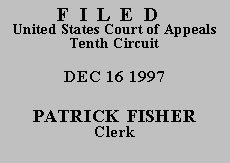

| UNITED STATES OF AMERICA,
v.
RICARDO AVALOS-CENTENO |
No. 97-4025
(D.C. No. 96-CR-18 S) (D. Utah) |
the district court erred in not granting Mr. Avalos-Centeno's request to deny the Government's recommended two-point enhancement of his criminal history score for his prior conviction on an escape charge. We hold that the district court did not err in refusing to disallow the recommended enhancement, and affirm.
I. Background
The facts underlying this case are not disputed by Mr. Avalos-Centeno or the Government. Mr. Avalos-Centeno was arrested on December 26, 1995 in Salt Lake City, Utah, for the offense to which he eventually pleaded guilty. (See Aplt. Br. at 3.) At the time of his arrest he was found to be in possession of a small amount of illegal drugs and approximately $6,500 in cash. After his indictment, Mr. Avalos-Centeno escaped from custody and went to Oregon for the claimed purpose of obtaining documentation for the cash found in his possession. (See id.) He then returned to Salt Lake City and turned himself in to authorities. (See id. at 3-4.) Mr. Avalos-Centeno pled guilty to the escape in a Utah court and was given a 180-day sentence. (See Presentence Report ("P.S.R.") at 7.)
The United States Probation Office recommended adding two points to Mr. Avalos-Centeno's criminal history score for that escape conviction, pursuant to U.S.S.G. § 4A1.1(b). (See P.S.R. at 8.) Mr. Avalos-Centeno objected to this enhancement. (See P.S.R. Addendum at 1.) At sentencing the district court addressed Mr. Avalos-Centeno's objection thus:
Relative to the escape, it does appear . . . that there are
some mitigating circumstances there which, of course, based
on my reading of the Sentencing Guidelines, these are matters
to be considered at the time of sentence, and I assume the
sentencing court did give consideration for that. I don't believe, however, that that is a basis to not assess the two points that
U.S. Probation assessed in this matter, unless the United States would consent that the Court not give that consideration.
( Sent. Rec. Vol. 2 at 4.) The Government did not give its consent. (See id.)
II. Discussion
We review a district court's application of the Sentencing Guidelines de novo. See United States v. Kissick, 69 F.3d 1048, 1051 (10th Cir. 1995). Here, Mr. Avalos-Centeno challenges his sentence on the basis that the district court refused to grant him a downward departure under the erroneous belief that it did not have the power to do so. Mr. Avalos-Centeno is correct in his assertion that this court has jurisdiction to review a district court's refusal to grant a downward departure only in the face of an unambiguous statement by the district court that the court believed it did not have the power to grant such a departure. See
United States v. Berrera-Barron, 996 F.2d 244, 245 (10th Cir. 1993). However, the district court's action in the case before us was not a refusal to grant a downward departure, but rather a decision to apply a criminal history enhancement under the Sentencing Guidelines. There is no evidence on the record before us that Mr. Avalos-Centeno ever requested that the court depart downward from his sentence, and we decline to interpret Mr. Avalos-Centeno's
objection to a suggested enhancement as a request for a downward departure.
Under U.S.S.G. § 4A1.1(b), a criminal defendant's sentence is to be increased by two points for "each prior sentence of imprisonment of at least sixty days" but less than one year and one month. See U.S.S.G. §§ 4A1.1 (a) & (b) (1995). Mr. Avalos-Centeno was convicted of the crime of escape by a Utah court and sentenced to 180 days of imprisonment. (See P.S.R. at 7.) This clearly qualifies as a "prior sentence of imprisonment of at least sixty days." U.S.S.G.
§ 4A1.1(b); see U.S.S.G. § 4A1.2(a)(1) (defining the term "prior sentence" as "any sentence previously imposed upon adjudication of guilt, whether by guilty plea, trial, or plea of nolo contendere, for conduct not part of the instant offense"). Mr. Avalos-Centeno objected to the enhancement on the grounds that his conduct underlying the escape conviction involved extenuating circumstances that the district court should take into account. (See P.S.R. Addendum at 1.) The district court considered Mr. Avalos-Centeno's objection, and decided that all extenuating circumstances had been addressed by the Utah court that sentenced Mr. Avalos-Centeno. (See Sent Rec. Vol. 2 at 4.) The court then adopted the Presentence Report's findings of fact and sentenced Mr. Avalos-Centeno. In doing so, the court correctly applied § 4A1.1(b) to calculate Mr. Avalos-Centeno's prior criminal history score.
III. Conclusion
For the above reasons, the district court's judgment is AFFIRMED.
The mandate shall issue forthwith.
ENTERED FOR THE COURT
David M. Ebel
Circuit Judge
*. After examining appellant's brief and the appellate record, this panel has determined unanimously that oral argument would not materially assist the determination of this appeal. See Fed. R. App. P. 34(f) and 10th Cir. R. 34.1.9. The case is therefore ordered submitted without oral argument. This order and judgment is not binding precedent, except under the doctrines of law of the case, res judicata, and collateral estoppel. The court generally disfavors the citation of orders and judgments; nevertheless, an order and judgment may be cited under the terms and conditions of 10th Cir. R. 36.3.